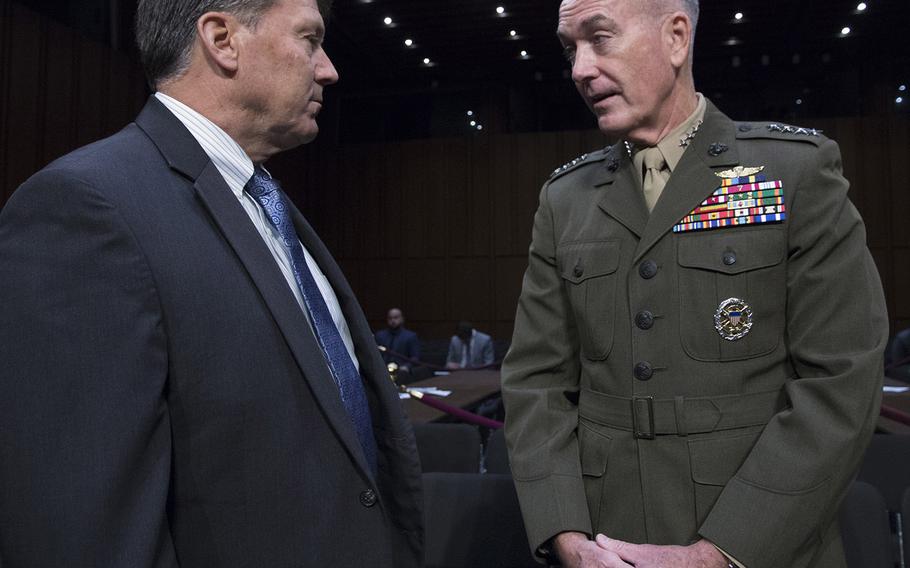
Gen. Joseph Dunford, chairman of the Joint Chiefs of Staff, talks with Sen. Mike Rounds, R-S.D., before Dunford's reappointment hearing on Capitol Hill, Sept. 26, 2017. (Joe Gromelski/Stars and Stripes)
WASHINGTON – The United States should assume North Korea can already strike its mainland with missiles, the top American general said Tuesday while cautioning that Kim Jong Un primarily seeks nuclear weapons to maintain control of his regime.
But amid heightened tensions between the two nations and as top leaders trade fiery rhetoric and threats of military action, the North Koreans have not altered their military posture in recent months, said Marine Gen. Joseph Dunford, the chairman of the Joint Chiefs of Staff.
“We watch that very carefully,” Dunford told lawmakers during a Senate Armed Services Committee hearing to consider his reappointment to chairman. “What we haven’t seen is [North Korean] military activity that would be reflective of that charged political environment.”
Dunford said North Korea poses the greatest immediate threat to the United States of all its enemies.
American intelligence officials believe North Korea could be able to strike the U.S. mainland as early as late 2018. Dunford, who is expected to be confirmed easily to serve a second term as chairman of the Joint Chiefs, said Tuesday that he agrees with that assessment.
“Whether it’s three months or six months or 18 months, it is soon,” he said. “We ought to conduct ourselves as though it is just a matter of time, a matter of very short time, before North Korea has that capability.”
The Pentagon has provided President Donald Trump with a range of military options for dealing with North Korea, but Dunford and Defense Secretary Jim Mattis have warned any strike on the Kim regime could result on a massive artillery barrage on Seoul, the capital of South Korea where 25 million people, including some 250,000 Americans, live. Mattis told reporters last week there are military options that do not endanger Seoul.
The Pentagon remains committed to backing the State Department-led efforts to keep nuclear weapons out of North Korea through diplomatic channels and economic sanctions, Dunford said. But he also warned U.S. intelligence assessments show Kim is unlikely to give up his nuclear or ballistic missile programs because the dictator believes they ensure he will remain in power.
In 2017, the Kim regime has launched 22 missiles, including two intercontinental ballistic missiles, or ICBMs, that experts believe are capable of traveling about 10,000 miles. The regime conducted its sixth nuclear test, and most powerful to date, on Sept. 3. Kim has stated his intention to develop a nuclear-tipped ICBM to strike the United States.
The North Koreans said this week that they intend to test a nuclear-capable ICBM over the Pacific Ocean soon, an unprecedented act that Dunford said would be “incredibly provocative.”
The North Koreans on Monday also accused Trump of declaring war on the regime and threatened to shoot down American warplanes flying in international airspace near their borders.
Multiple senators warned Tuesday that they were concerned such rhetoric from both sides increased the potential for miscalculation that could lead to a brutal war.
“I have a queasy feeling that we are in 1914 stumbling toward Sarajevo,” Sen. Angus King, I-Maine, said, citing the location of events that triggered World War I. “What worries me is not an instantaneous nuclear confrontation but an accidental escalation based upon the rhetoric that is going back and forth.”
Sen. Jack Reed, D-R.I., said Trump’s tweets and rhetoric toward North Korea – among other subjects -- “lend more uncertainty to already dangerous times and, I believe, the risks of miscalculation and unintended consequences have never been higher.”
Dunford, who did not specifically comment on the political rhetoric, said the United States, for now, is adequately protected against threats to U.S. territory. But he urged lawmakers to invest in upgrades to the nation’s ballistic missile defense, which will be needed as North Korea – and other nations – increase their capabilities.
“Frankly, I think we should assume today that North Korea has that capability and has the will to use that capability,” he said.
dickstein.corey@stripes.com Twitter: @CDicksteinDC